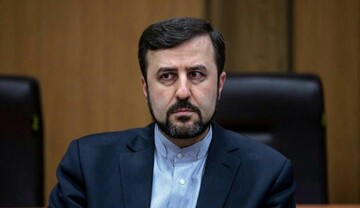Speaking to reporters, Kazem Gharibabadi said Iran is among 62 countries that implement additional protocols and safeguards agreements but still lack the IAEA’s broader aggregation of the articles and activities which have not yet been declared.
Based on the reports about implementing IAEA safeguards in 2019, from 466 inspections among member states, 432 ones were related to Iran which is equal to 92 percent of total inspections in its group, and 20 percent of them in the world, he added.
He noted that from 45 additional accesses among a 62-member group in 2019, 33 accesses have been made in Iran which is equal to 73 percent of the total accesses in this group and 24 percent total in the world.
Referring to Iran’s full transparency in its peaceful nuclear program and that a significant volume of the agency's inspections is carried out under the influence of Iran nuclear deal known as the Joint Comprehensive Plan of Action (JCPOA), Gharibabadi said thanks to unfavorable conditions of the JCPOA, Europe’s lack of commitment and the US’ plans to carry out other destructive measures in the UNSC and out of it, cooperation is not the only option for Iran.
Iran has a range of options like establishing cooperation, returning to safeguards commitments, and revising these commitments that it will adopt one of them based on other parties' acts, he reiterated.
In the wake of the US unilateral and illegal withdrawal from the JCPOA, Iran tries to preserve the deal on the condition that other parties comply with their commitments.
But after about two years and due to the Europeans' inability to be committed, Iran started reducing JCPOA-related commitments aiming to preserve Iran's economic interests.
Britain, France, and Germany initiated a process that could lead to the United Nations' sanctions being re-imposed on Iran and the collapse of the 2015 nuclear deal despite the fact that they did not fulfill their commitments to the JCPOA after the US withdrawal since May 2018.
High Representative of the European Union Josep Borrell said earlier "On 14 January, I received a letter from the Foreign Ministers of France, Germany and the United Kingdom (UK) referring a matter concerning the implementation of Iran's commitments under the Joint Comprehensive Plan of Action (JCPOA) to the Joint Commission for resolution, triggering the Dispute Resolution Mechanism.”
"I have subsequently undertaken extensive bilateral and collective consultations. All the JCPOA participants reconfirmed their determination to preserve the agreement which is in the interest of all," he added.



Your Comment